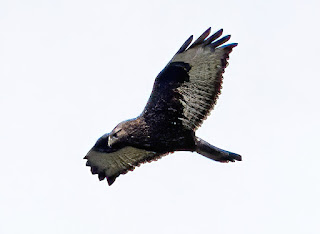NATURE
MONCTON NATURE INFORMATION LINE, Oct. 31, 2021 (Sunday)
To respond
by e-mail, please address your message to the information line editor, nelsonpoirier435@gmail.com .
Please
advise the editor at nelsonpoirier435@gmail.com
if any errors are noted in wording or photo labelling.
For more information on Nature Moncton, check the website at www.naturemoncton.com .
Edited by:
Nelson Poirier nelsonpoirier435@gmail.com
**Yvette Richard noted 2 huge flocks of Common Eiders passing overhead Saturday afternoon in the Cocagne area heading north toward Northumberland Strait.
She has seen
quite a few flocks passing the past few days.
Yvette got
nice flight photos of 2 male Ring-necked
Ducks at Arthur Street Lagoon in Memramcook on Friday. She also got a nice
photo of Northern Shoveler Ducks on Friday swimming in a tight circle foraging
which is a strategy of the species.
A large
flock of European Starlings were
doing their acrobatics then settle down on utility wires in soldierly
fashion.
Yvette also
photographed a group of mixed gender Green-winged
Teal at the Sackville St. James Street Lagoon on October 24.
**Georges
Brun also noted a flock of Common Eider flying
by at the bend of the Petitcodiac River on Friday afternoon of approximately
150 + birds headed SSW into Albert County.
With 2
back-to-back reports of Common Eider flocks, there is assumedly large numbers
moving through at the moment.
Georges also
got a nice photo of a male Northern Pintail back in breeding plumage at
Bis Marsh Pond. Georges comments there was/is a good water level there this
year attracting birds where much of it was dry land last season. Georges has also been noting 2 Northern harrier Hawks hunting the Riverview Marsh all summer. Will the Short-eared owls rejoin us there this winter??
**Ron Arsenault comments on
the bizarre Canada Goose in yesterday’s edition and agrees with the
assessment of a genetic anomaly of some sort. He sees no evidence of
hybridization with another species, nor does he see any evidence of anything
that suggests "captive influence" for this bird (although the
probability is likely very low, this does not completely eliminate the
possibility of domestic influence). The photo is reattached today.
Ron suggests
checking out this link for these plumage aberrations in birds:
https://www.sibleyguides.com/2011/08/abnormal-coloration-in-birds-melanin-reduction/
**Aldo
Dorio’s Red Knot group swelled to 9
on Saturday at Hay Island. I felt that may be a high number but Gilles Belliveau suggests
that may not be the case in more recent years with Horseshoe Crab fishing in
Chesapeake Bay reduced (my words). I’m going to quote Gilles below as his
suggestions on 2 spots many of us don’t check at this time of year should be
considered.
Quoting
Gilles:
“When Marcel David used to do his shorebird surveys at
various sites in the Acadian Peninsula, he regularly reported flocks of Red Knots (sometimes considerable amounts).
Also, the
past few 2-3 years, I’ve been going to check Johnson Mills in October and
November and was seeing quite a few there as well. I don’t recall exact
numbers, but I think I’ve had 30-50+ at least a couple of times. I’ve checked a
few times this fall but I haven’t seen any shorebirds there when I’ve checked
but there are usually Black-bellied Plover, Semipalmated Plover, Dunlin,
White-rumped Sandpiper, Sanderling and Red Knots at this time of year.
I’ve also
gotten a few to a dozen or more Red Knots at the Dorchester Lagoon several
times in recent years.”
Aldo also
had a good day in getting close enough to get photos of some of a group of 8 Black-bellied
Plovers in a grassy area near Hay Island. I, suspect like others, find it
hard from photos to rule out American Golden-Plovers so had to again ask Gilles
Belliveau to straighten me out. Gilles wisely commented:
“While I can certainly see some things that may
suggest a potential American Golden-Plover for a few of these birds (a few
appear to have stronger facial patterns than most Black-bellied Plovers), I
believe they are all Black-bellied Plover.
To me, the
bill doesn’t look small enough and the primary projection is not as long as I
would expect for an American Golden-Plover (both in relation to the tertials
and also in relation to the tail)
You can also
see some white at the base of the tail on a few of these birds which you
shouldn’t see on an American Golden-Plover.
They all
appear to be a mixture of white, black and gray with no yellowish or golden
tones to them but colour can be difficult to judge in photos."
**Brian Stone drove around the Tantramar Marsh on Saturday to see if any birds of interest were present but saw nothing exotic, just the normally expected birds. He saw several NORTHERN HARRIER HAWKS flying and perching in the distance. Also, a couple ROUGH-LEGGED HAWKS were perching and flying as well. At least the weather was great, and the roads were dry. A few goats were interested in Brian’s presence wondering what he was up to and although not our favorite bird, a European Starling was photo candy.
Nelson Poirier
Nature Moncton




















